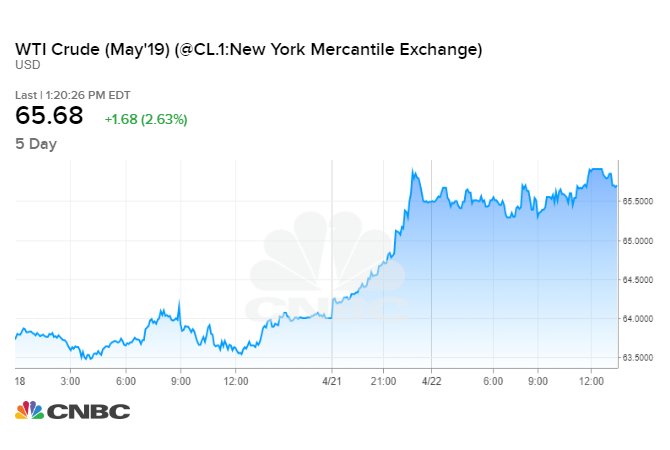ราคานํ้ามัน ( Wti ) ปรับตัวเพิ่มขึ้นไปปิดที่ 65.66 USD Per Barrel เมื่อวานนี้ วันที่ 22 เมษายน ปี พ.ศ 2562 ซึ่งมีสาเหตุมาจาก " สหรัฐอเมริกายกเลิกคําสั่งผ่อนผันแก่ประเทศที่นําเข้านํ้ามันจากอิหร่าน 8 ประเทศ โดยจะมีผลตั้งแต่วันที่ 2 พฤษภาคม ปี พ.ศ 2562 เป็นต้นไป "
การที่ราคานํ้ามันปรับตัวสูงขึ้นอย่างนี้ ก็น่าจะทําให้ตลาดหุ้นไทยปรับตัวตามขึ้นไปเพราะหุ้นตัวใหญ่ๆที่ถ่วงดัชนีตลาดหุ้นไทยเช่น PTT, PTTEP และ PTTGC เป็นต้น เป็นหุ้นที่ปรับตัวขึ้นตามราคานํ้ามันทั้งนั้น ตามรายละเอียดของข่าว ดังนี้ คือ :
น้ำมันทะยาน 2.7% สู่ระดับสูงสุดในรอบเกือบ 6 เดือนโดยอยู่ที่ระดับ 65.70 ดอลลาร์หลังจากทรัมป์แตกหักการส่งออกน้ามันของอิหร่าน :
เผยแพร่เมื่อวันจันทร์ที่ 22 เมษายน 2019 • 1:22 น. EDT อัพเดท 19 นาทีที่แล้ว
Tom DiChristopher @ TDICHRISTOPHER
Weizhen Tan @ WEIZENT
จุดสำคัญ
1) ผู้บริหารทรัมป์ประกาศว่าจะคว่ำบาตรแก่ประเทศที่กำลังนำเข้าน้ำมันอิหร่านโดยเริ่มตั้งแต่วันที่ 2 พฤษภาคม ปี พ.ศ 2562 เป็นต้นไป
2) การขู่ดังกล่าวข้างต้นมีผลทำให้น้ามันออกจากตลาดประมาณ 1 ล้านบาร์เรลต่อวัน
3) การเคลื่อนไหวเกิดขึ้นเนื่องจากตลาดน้ำมันมีความตึงตัวอยู่แล้วและราคาน้ำมันดิบและน้ำมันเบนซินก็เพิ่มสูงขึ้น
ราคาน้ำมันปรับตัวสูงขึ้นประมาณ 3% ในช่วงเที่ยงของวันจันทร์แตะระดับสูงสุดใหม่ในปี 2019 หลังจากที่ทรัมป์ประกาศว่าผู้ซื้อน้ำมันทุกรายจะต้องยุติการนำเข้าจากอิหร่านในเวลาเพียงหนึ่งสัปดาห์
ฝ่ายบริหารกล่าวว่ากระทรวงการต่างประเทศจะคว่ำบาตรแก่ประเทศใด ๆ ที่ยังคงนำเข้าน้ำมันดิบอิหร่านหรือคอนเดนเสทซึ่งเป็นน้ำมันดิบที่เบามากหลังจากวันที่ 2 พฤษภาคม ปี พ.ศ 2562 เป็นต้นไป
น้ำมันดิบเบรนท์ซึ่งเป็นมาตรฐานสากลสำหรับราคาน้ำมันปิดที่ 2.07 ดอลลาร์อยู่ที่ 74.04 ดอลลาร์เพิ่มขึ้น 2.9% จากราคาปิดที่ดีที่สุดนับตั้งแต่วันที่ 31 ต.ค. 2561 เบรนต์เพิ่มขึ้นสูงถึง 74.52 ดอลลาร์ต่อบาร์เรลในช่วงเที่ยงวัน $ 72.27
สัญญาซื้อขายล่วงหน้าน้ำมันดิบล่วงหน้า West Texas Intermediate ของสหรัฐอเมริกาอยู่ที่ 1.70 ดอลลาร์เพิ่มขึ้นที่ 65.70 ดอลลาร์เพิ่มขึ้น 2.7% สู่ระดับสูงสุดในรอบเกือบ 6 เดือน ก่อนหน้านี้ WTI เพิ่มขึ้นสูงถึง $ 65.92 ซึ่งเป็นระดับที่แข็งแกร่งที่สุดนับตั้งแต่วันที่ 31 ต.ค. 2018 WTI ซื้อขายไปด้านข้างเป็นเวลาประมาณสองสัปดาห์หลังจากพุ่งแตะระดับ 64.79 ดอลลาร์ในเดือนก่อนหน้า
สัญญาน้ำมันดิบพุ่งแตะระดับสูงสุดใหม่ในปี 2019 หลังจากรายงานโดยนโยบายใหม่ของ Washington Poston the Trump administration
สิ่งที่น่าประหลาดใจก็คือแรงผลักดันให้เกิดการทะลุผ่านของราคาน้ำมันนายไมเคิลแบรดลีย์นักยุทธศาสตร์ของธนาคารเพื่อการลงทุน Tudor Pickering Holt กล่าว
“ ตลาดน้ำมันดิบได้รับความประหลาดใจในวันนี้เนื่องจากการบริหารของทรัมป์ระบุว่าจะไม่ต่ออายุยกเว้นที่อนุญาตให้ประเทศต่างๆซื้อน้ำมันอิหร่านโดยไม่ต้องเผชิญกับการคว่ำบาตรของสหรัฐฯ” เขากล่าวในงานวิจัย “ หลายคนคาดหวังว่าสหรัฐฯจะดำเนินการอย่างเข้มงวดยิ่งขึ้นต่อหน้าผู้สละสิทธิ์ แต่ DIDN ส่วนใหญ่ไม่คาดหวังว่าจะมีการประกาศการสละสิทธิ์เป็นศูนย์”
การคว่ำบาตรสหรัฐในเดือนพฤศจิกายนที่ผ่านมาเกี่ยวกับการส่งออกน้ำมันอิหร่านหลังจากประธานาธิบดีโดนัลด์ทรัมป์ประธานาธิบดีสหรัฐดึงออกมาจากข้อตกลงนิวเคลียร์ที่เกิดขึ้นในปี 2558 ระหว่างอิหร่านและมหาอำนาจโลก อย่างไรก็ตามวอชิงตันได้รับการยกเว้นผู้ซื้อน้ำมันรายใหญ่ที่สุดของอิหร่านแปดรายซึ่งอนุญาตให้พวกเขาซื้ออย่าง จำกัด เป็นเวลาหกเดือน
ผู้ซื้อแปดรายคือจีนและอินเดีย - ลูกค้ารายใหญ่ที่สุดของอิหร่าน - รวมถึงญี่ปุ่นเกาหลีใต้ตุรกีอิตาลีกรีซและไต้หวัน การยกเว้นได้อนุญาตให้อิหร่านส่งออกได้ประมาณ 1 ล้านบาร์เรลต่อวันลดลงจาก 2.5 ล้านบาร์เรลต่อวันในปีที่แล้ว
การตัดสินใจที่จะยุติการผ่อนผันเกิดขึ้นเนื่องจากอุปทานล้นตลาดหมดไปอย่างรวดเร็วจากตลาดน้ำมันหลังจากหลายเดือนของการลดการผลิตซึ่งนำโดยซาอุดิอาระเบีย ผู้ส่งออกน้ำมันอันดับต้น ๆ กำลังเป็นหัวหอกในการผลักดันความพยายามของกลุ่มโอเปค และผู้ผลิตรายอื่นรวมถึงรัสเซียที่จะหยุดการผลิต 1.2 ล้านบาร์เรลต่อวัน
“ ปฏิกิริยาของตลาดที่คุณเห็นอยู่ในตอนนี้ก็เพราะเราอยู่ในสถานการณ์ที่อุปทานตึงตัวเพราะความพยายามของซาอุดิอาระเบียในช่วงหลายเดือนที่ผ่านมา” จอห์น คิลดัฟฟ์หุ้นส่วนผู้ก่อตั้งกองทุนป้องกันความเสี่ยงพลังงานอีกครั้งกล่าวกับ CNBC Squawk Box” ในวันจันทร์
ราคาเบรนต์ได้ปรับตัวสูงขึ้น 38% และน้ำมันดิบสหรัฐเพิ่มขึ้นเกือบ 45% ในปีนี้หลังจากการล่มสลายของต้นทุนน้ำมันดิบในเดือนสุดท้ายของปี 2561
ในแถลงการณ์ทำเนียบขาวกล่าวว่าสหรัฐฯจะทำงานร่วมกับสมาชิกโอเปกซาอุดิอาระเบียและสหรัฐอาหรับเอมิเรตส์“ เพื่อดำเนินการตามเวลาที่กำหนดเพื่อให้มั่นใจว่าความต้องการทั่วโลกได้รับการตอบสนองเนื่องจากน้ำมันอิหร่านทั้งหมดถูกลบออกจากตลาด”
นายคาลิด อัลฟาลิห์รัฐมนตรีว่าการกระทรวงพลังงานของซาอุดิอาระเบียกล่าวว่าราชอาณาจักรจะ“ ประสานงานกับผู้ผลิตน้ำมันเพื่อนเพื่อให้แน่ใจว่ามีผู้บริโภคเพียงพอในขณะที่ตลาดน้ำมันโลกไม่สมดุล”
"การตัดสินใจ #US เพื่อยุติการคว่ำบาตรในการนำเข้าน้ำมัน #Iran จะไม่ให้บริการสันติภาพและความมั่นคงในภูมิภาค แต่จะเป็นอันตรายต่อประชาชนชาวอิหร่าน #Turkey ปฏิเสธการคว่ำบาตรและการกำหนดมาตรการฝ่ายเดียวในการดำเนินการความสัมพันธ์กับเพื่อนบ้าน @StateDept @ SecPompeo
21:41 น. - 22 เม.ย. 2019 "
ในขณะเดียวกันเมืองหลวงตริโปลีผู้ผลิตน้ำมันโอเปกรายใหญ่ของลิเบียได้รับผลกระทบจากการโจมตีทางอากาศและการระเบิดหลายครั้งในช่วงสุดสัปดาห์เพื่อเพิ่มความรุนแรงซึ่งอาจส่งผลกระทบต่ออุปทานน้ำมันต่อไป
ประเทศได้รับความเสียหายจากความขัดแย้งนับตั้งแต่การล่มสลายของเผด็จการ Muammar Gaddafi ในปี 2554 สาธารณรัฐสังคมนิยมประชาชนอาหรับลิเบียกำลังอยู่ในช่วงที่เกิดสงครามกลางเมืองเต็มรูปแบบหลังจากผู้นำทางทหารตะวันออกสั่งให้กองกำลังของเขาเข้าตริโปลีซึ่งเป็นคู่แข่งของรัฐบาล .
สถานการณ์ในลิเบียอาจนำไปสู่การลดลงของการผลิตน้ำมันอย่างรวดเร็ว Kang Wu หัวหน้าฝ่ายวิเคราะห์ของเอเชียที่ S&P Global Platts กล่าว
“ ลิเบียกำลังผลิต 1.1 ล้านบาร์เรลต่อวัน หากมีสิ่งผิดปกติเกิดขึ้นทันทีบางแห่งอาจมีผลกระทบกับน้ำมันประมาณ 300,000 ถึง 400,000 บาร์เรลต่อวัน” เขากล่าว
“ มากขึ้นอยู่กับว่าซาอุดิอาระเบียจะตอบสนองต่อสถานการณ์อย่างไร - พวกเขามีกำลังการผลิตส่วนเกิน - แต่ความกังวลด้านอุปทานจะกดดันราคาน้ำมันในระยะสั้น "วูกล่าวเสริม
ทวีตจาก @realDonaldTrump
"ซาอุดิอาระเบียและคนอื่น ๆ ในโอเปกจะชดเชยความแตกต่างของการไหลของน้ำมันในขณะนี้การคว่ำบาตรเต็มรูปแบบของเราเกี่ยวกับน้ำมันอิหร่านอิหร่านกำลังได้รับคำแนะนำที่แย่มากโดย @JohnKerry และผู้ที่ช่วยเขานำสหรัฐเข้าสู่ข้อตกลงนิวเคลียร์อิหร่านที่แย่มาก . การละเมิดพระราชบัญญัติโลแกนใหญ่ " (22/4/2019)
หมายเหตุ : 1) โปรดติดตามการ Long และ Short Set 50 Index Futuresในระยะยาวได้ใน longtunbysak.blogspot.com
2) ที่มาจาก ( www.cnbc.com ) ตามรายละเอียดเนื้อข่าวจากต้นฉบับภาษาอังกฤษ ดังนี้ คือ :
Oil surges 2.7% to nearly 6-month high, settling at $65.70, after Trump cracks down on Iran exports :

